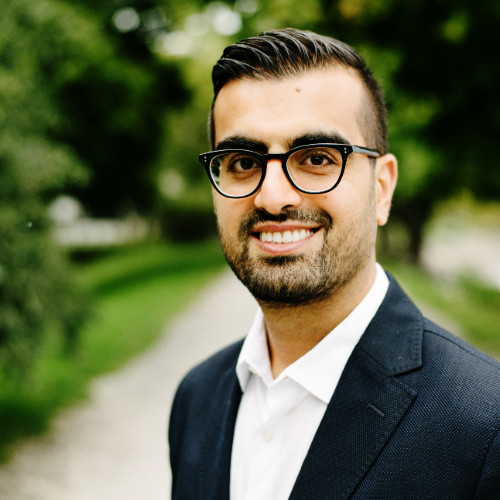When he graduated from the MMF program, Shahpour Turkian (MMF 2014) spent five years working as quant at two of Canada’s big five banks. He recently joined fintech start-up Atlas Capital, a mission-driven firm that seeks to maximize investor returns while making long-term responsible and sustainable investments in real assets. They’re also launching an investment strategy based on the current economic and climate risk factors.
We asked Shahpour what skills from his time in banking paid forward when he applied for the job at Atlas Capital, and why he’s excited to be working at a fintech start-up.

When Shahpour Turkian completed his MMF degree in 2014, his first job was at Toronto-based Prism Valuations, which provided independent valuations and risk analysis services to financial institutions. It was acquired by the U.K.’s Markit Group Inc. in 2016, where it was integrated into Markit’s portfolio valuations service.
While that was a great experience, working at a major bank was Shahpour’s long-term goal. He left Prism and spent a year at CIBC World Markets as an Equity Markets Associate, where he was focused on algorithmic trading and ultra-low latency market access products, before moving on to become a Quantitative Analyst at BMO.
“The difference between working at a smaller firm like Prism compared to a major bank is that banks have a greater number of stakeholders,” Shahpour said. “At the banks I experienced more scrutiny in terms of what I did, and the outcomes I produced.”
Fast forward to April 2022. By then, Shahpour’s experience in banking sparked his desire to move into investment management. Preparing to do that meant reaching out to his network. MMF alumni have life-long access to career advisory services, so he contacted Tracy Barber at MMF to talk about his transition into investment management. He also asked to be kept in mind for any opportunities she may hear of that matched his skills and experience.
As luck would have it, a few days later Tracy got a cold call from Atlas Capital’s CIO, Puneet Agarwal, asking for a meeting while he was visiting Toronto. Puneet had heard about the MMF program’s reputation for producing top-notch quants. He was hoping to acquire talent that could anchor the soon-to-open Toronto office. With a priority focus on helping students and new grads secure employment, Tracy hoped there would be interest in interns or entry level opportunities. But after learning more about the role and the more senior experience it required, Tracy quickly realized that Shahpour was a strong fit for Atlas.
Shahpour’s experience running technical analyses, scenario analyses, stress-testing and building simulations translated well to the Portfolio Analytics and Model Development role at Atlas. His familiarity with data science principles and applications of machine learning investment management in efficient portfolio diversification or regime analysis was also transferrable. Most importantly, his ability to tell a story about market trends supported by market data, and to draw parallels between historical instances where similar trends prevailed, made him stand out as a candidate.
Tracy sent Shahpour the Atlas job description and asked if he would like to connect with Puneet. After studying the firm and consulting with a few friends, Shahpour decided to apply.
The recruiting process included three rounds of interviews. The first round was with the hiring manager, then Shahpour moved on to an interview with senior executives. Finally, he met with the CEO. The interview questions Shahpour encountered mostly centered around his previous experiences and they ranged from technical questions to an examination of his broader views on the market, along with the future of the monetary system and the ABCDs of fintech: AI, Blockchain, Cloud Computing, and big Data.
From introduction to interviews, from to offer to start date, the whole process took about four months, but was well worth the effort for both parties. Shahpour is very happy to be part of Model Development and Portfolio Analytics team at Atlas. His responsibilities include building and enhancing their quantitative portfolio construction models, as well as managing portfolio execution and attribution analytics.
Shahpour feels lucky to collaborate with some of the brightest, most genuine people in the industry. “They have been part of, and lead, successful teams at big name organizations and I’m looking forward to working in partnership with them.”
A core tenet of their asset allocation framework is an investment in real estate assets that are both climate resilient over the long term and ESG compliant. A diverse set of data and models is used to identify real estate investment opportunities that are expected to evolve into highly sought-after sustainable communities over time. This aspect of responsible investing is very appealing to Shahpour.
When asked what advice he has for others who want to work in this area, Shahpour says being honest with yourself is a good start.
“Network to find out where your gaps are and do you best to close those gaps,” he says. “We often overlook the lessons we can learn when something doesn’t work out. Study those failures and decide what you can do better should you find yourself in a similar scenario. Don’t be afraid to take a chance. Be the best at what you do and explore all available opportunities.”
